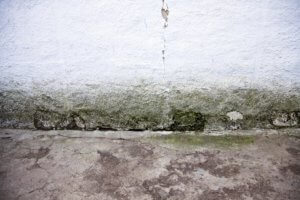Basements are versatile spaces. You can use them as storage or lounging— it all depends on your preference. Either way, they’re vulnerable to flooding and water damage if left unchecked because they are located at the foundation of your home, where little sunlight or air circulation is found.
With little air circulation and sunlight, water and moisture can create a lot of problems for a basement. Mold growth, water damage, and stains, just to name a few.
Often, basements are used as storage spaces for items that you don’t usually use. Hence, basements are sometimes maintained less than the rest of the home. Lack of maintenance of basements can lead to leaks, cracks, and damages, which can worsen over time.
In some cases, the damage has already gotten so severe that homeowners would need to bring in professional help.

The truth is, you can’t stop a flood from happening, especially from stormy weather or natural causes. However, you can be proactive and lessen the damage it leaves by taking precautions early on.
The key to preventing water damage and mold growth is removing the source of water and routine inspection.
To narrow down what you can do to waterproof your basement, here are five waterproofing tips you can apply to your home today:
1. Regularly inspect your home

Going around your home and inspecting for damage regularly can be tedious and boring. However, examining every area of your house can benefit you in the long run. Most of the time, sources of water come from leaks and cracks.
Sometimes, you might not know until a puddle of water forms on your basement floor. By the time this happens, it might be a little too late to patch up those leaky pipes.
Taking the time to walk around your home to check visible pipes for any leaks or signs of wear is recommended to prevent water damage problems.
Keeping your pipes in tip-top shape will also help you if your pipes do burst. Your insurance company will most likely cover the costs if it shows that you maintain your pipes well. On the other hand, neglected pipes that get damaged will not be covered by your insurance company.
Invisible pipes or pipes that are in crawl spaces or foundation walls can be harder to observe. If you are uncomfortable with going to small spaces to check your pipes, hiring a professional to inspect your home is highly recommended. Although it might seem costly, it’s better to spend a bit of money on a yearly inspection than a lot of money on repairs for various leaks and cracks.
2. Update your appliances

Appliances may seem durable on the outside, but they can wear down and malfunction like everything else. Your appliances need to be monitored regularly and maintained. Throughout time, they can break down.
Washing machines and refrigerators are prone to breaking down and leaking if they malfunction. However, you don’t want to wait until your floors are soaking wet to call for help. This can be a massive problem if you have wooden floorboards because you won’t spot water seeping in. This can cause permanent damage to your floors.
Another reason to monitor your appliances is to avoid fatal accidents from water and electrical outlets interacting.
So, keep an eye on your appliances and get them repaired or replaced if needed to avoid any issues. Pay attention to appliances such as washing machines, refrigerators, and any appliance that requires water to function.
3. Listen or look for signs

Sometimes, signs of water damage can be found just by paying attention to them. For example, you might be able to smell something musty, which can signify mold growth. Stains on walls or ceilings can show water seeping into rooms. Sounds of water dripping can signal leaky pipes.
Be sure to pay extra attention in your basement since most pipes are placed there. It’s also important to be more cautious about basements since they often become the most damaged due to their placement and lack of air circulation.
4. Keep your home as dry as possible

Keep your basement as dry as possible. Humidity is a significant factor in water damage. So, if your basement is highly humid, it can cause huge problems. Lack of ventilation and moisture is the perfect combination for mold growth.
So what can you do to keep your basement dry?
We suggest opening its windows (if there are any) from time to time to let the air in. If you have the funds, you can invest in a dehumidifier or air conditioner.
5. Repair Damages As Soon as You Can

The last tip is to repair any crack or leak you see as soon as you can. If you spot any small cracks or leaks you can fix yourself; it would be wise to patch it up soon. The longer you leave it, the worse it will get.
If you spot any large leaks or cracks you cannot fix yourself, it’s best to call for professional help.
Wrapping Up

Waterproofing your basement is more than applying sealant on walls to prevent water from seeping in. It takes care and attention from you to observe and maintain your home. Although it might seem tedious at first, these tips will benefit you in the long run and lessen the load when it comes to dealing with water damage or mold growth.
Remember to schedule routine inspections, maintain and update your appliances, keep your home dry, and fix leaks or cracks as soon as possible.


